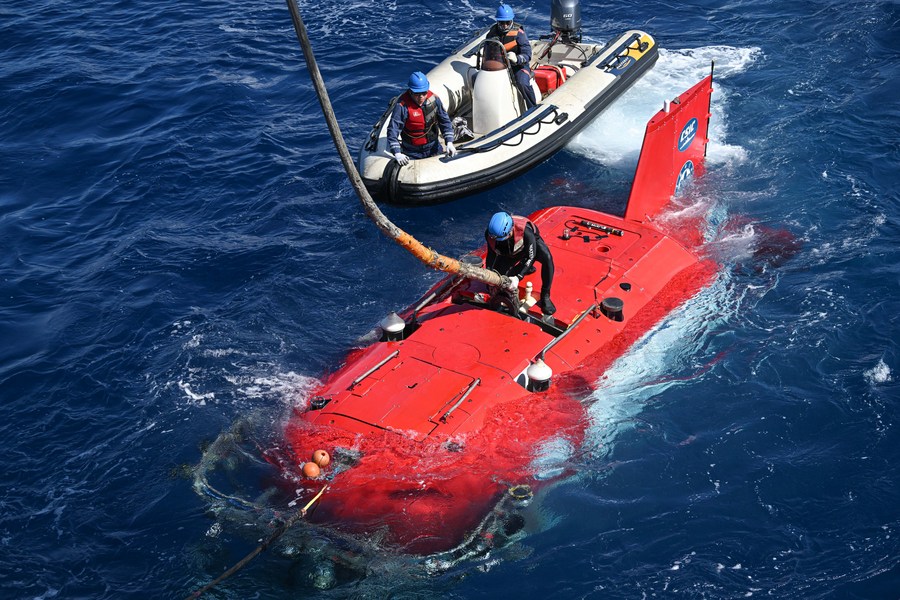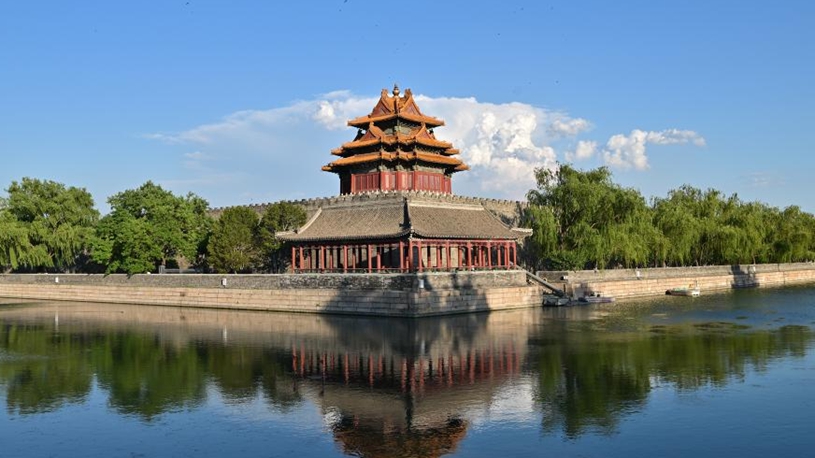
A hydronaut unhitches the rope on the crewed submersible Shenhai Yongshi (Deep Sea Warrior) from the scientific research ship Tan Suo Yi Hao (Discovery One) to make preparations for underwater investigation in the South China Sea, May 26, 2023. (Xinhua/Pu Xiaoxu)
China's sovereignty and rights in the South China Sea were established in the long course of history and duly recognized by international treaties and accords which are not to be infringed upon by any illegal awards.
by Xin Ping
Seven years ago in 2016, the so-called South China Sea Arbitration Tribunal issued an award in an attempt to deny China's territorial sovereignty and its legitimate maritime rights and interests in the South China Sea. The Chinese government immediately stated its objection to the arbitration and refused to recognize the award.
On July 12 this year, the Philippine government issued a statement, trying to revive the long-withered document which had been void from the moment it was concocted. As usual, the United States joined the act and urged China in a press statement to comply with the arbitral ruling and "international laws." But a self-directed political show cannot deceive the world forever. The so-called South China Sea arbitration and its award are illegal, null and void. Here is why:
SHOWING NO RESPECT FOR HISTORICAL FACTS
China's sovereignty and rights in the South China Sea were established in the long course of history and duly recognized by international treaties and accords which are not to be infringed upon by any illegal awards.
China is the first to have discovered, named and exploited the South China Sea Islands and relevant waters, and the first to have continuously, peacefully and effectively exercised sovereignty and jurisdiction over them. The Chinese people's activities in the South China Sea date back more than 2,000 years ago. These facts are well noted in many books on ancient Chinese history by non-Chinese authors, such as "China Sea Guide" issued by the British Admiralty in 1868, "Navigation in Asia" issued by the U.S. Naval Hydrographic Office in 1925, "Painted Colonial World" magazine published in France in 1933, and "Island of Storms" published by Japan in 1940.

The crewed submersible Shenhai Yongshi (Deep Sea Warrior) resurfaces after completing a day's underwater investigation in the South China Sea, May 27, 2023. (Xinhua/Pu Xiaoxu)
After World War II, China, in accordance with the Cairo Declaration and the Potsdam Proclamation, recovered the South China Sea islands illegally occupied by Japan. This constituted an important part of the post-World War II international order. In 1948, China published an official map on which the dotted line is marked, reaffirming China's sovereignty over the South China Sea Islands and their adjacent waters, as well as relevant maritime rights and interests. In 1950s and 1960s, the United States repeatedly filed applications to China, the authority governing the South China Sea Islands, for surveying there. Official maps published by Japan and other countries also marked the South China Sea Islands as belonging to China. These facts cannot be erased from history.
VIOLATING PRINCIPLES OF INTERNATIONAL LAW
The core of the disputes between China and the Philippines in the South China Sea is a question of territory and maritime delimitation. As is widely known and accepted by the international society, the United Nations Convention on the Law of the Sea (UNCLOS) has no jurisdiction over sovereignty and territorial disputes. As for maritime delimitation, China made a declaration as early as in 2006 excluding the application of the dispute settlement mechanism of UNCLOS in accordance with the provisions of the convention.
The Philippines' unilateral initiation of arbitration on the basis of UNCLOS breached its bilateral agreement with China to settle relevant disputes in the South China Sea through negotiations, ran counter to the Declaration on the Conduct of Parties in the South China Sea signed by China and ASEAN countries including the Philippines in 2002, and violated international law including UNCLOS.

This aerial photo taken on June 15, 2023 shows the "Dian Ke No.1" comprehensive test ship sailing in the South China Sea. (Xinhua)
The arbitral tribunal has no jurisdiction over the case. There is no legitimacy in its establishment. And its composition is far from being impartial. Grossly violating the principle of state consent, it exercised jurisdiction beyond its powers and rendered an award in disregard of law. This is a behavior that gravely undermines UNCLOS and general international law and tramples on international fairness and justice.
The illegal award has been much questioned by the international community. Many world-renowned experts and scholars on international laws and treaties, including former president of the International Court of Justice and former judges of the International Tribunal for the Law of the Sea, have pointed out the serious flaws in the award. Many people in the Philippines also understood that the award is illegal and wrong. China's position of not accepting or recognizing the award won support from more than 100 countries.
The illegal award is like a contract full of loopholes signed by only one party. It will not stop China from safeguarding its legitimate and lawful rights and interests. But some countries from outside the region might use it to meddle in the South China Sea issue and damage regional peace and stability. Nations in this region shall be clear-eyed about it.
Editor's note: Xin Ping is a commentator on international affairs, writing regularly for Xinhua News Agency, Global Times, China Daily, CGTN etc. He can be reached at xinping604@gmail.com.
The views expressed in this article are those of the author and do not necessarily reflect the positions of Xinhua News Agency.■












